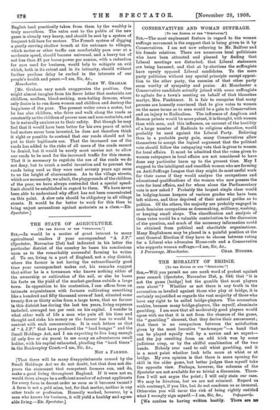CONSERVATIVES AND WOMAN SUFFRAGE.
[TO THE EDITOR or THE "SPECTATOR"] SIE,—The most unpleasant feature in regard to the woman suffrage movement is the support that is being given to it by Conservatives. I am not now referring to Mr. Balfour and his female relatives. There are numerous local politicians who have been attracted and pleased by finding that Liberal meetings are disturbed, that Liberal statesmen are being harassed, and that at by-elections the suffragists have openly opposed Liberal candidates. To the mere party politician without any special principle except opposi- tion to the other party, the enemies of that other party seem worthy of sympathy and praise. At Manchester a Conservative candidate actually joined with some suffragists to agitate for a town's meeting on behalf of that blameless martyr, Mrs. Pankhurst. It is fair to recognise that many persons are honestly convinced that to live votes to women on the same terms as to men would be a gain to Conservatism and an injury to Radicalism. The influence of Anglican and Roman priests would be more potent, it is thought, with women than with men, and this influence, on account of the hostility of a large number of Radicals to religious education, would probably be used against the Liberal Party. Believing thus in a probable party gain, many Conservatives allow themselves to accept the logical argument that the political vote should follow the ratepaying vote that is given to women for local affairs. It must be admitted that the votes given to women ratepayers in local affairs are not considered to have done any particular harm up to the present time. May I suggest to the intelligent and unselfish women who are forming an Anti-Suffrage League that they might do mostuseful work for their cause if they would analyse the occupations and educational qualifications of the women who now possess the vote for local affairs, and for whom alone the Parliamentary vote is now asked P Probably the largest single class would be lodging-house keepers of various grades who have been left widows, and thus deprived of their natural guides as to politics. Of the others, the majority are probably engaged in such feminine occupations as dressmaking, millinery, washing, or keeping small shops. The classification and analysis of these votes would be a valuable contribution to the discussion of the question, and much of the necessary information could be obtained from political and charitable organisations. Many Englishmen may be placed in a painful position at the next General Election if they have to choose between voting for a Liberal who advocates Home-rule and a Conservative who supports woman suffrage.—I am, Sir, &c.,


















































 Previous page
Previous page